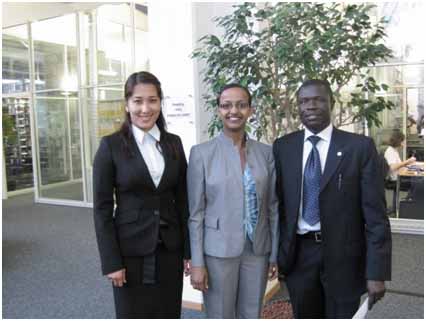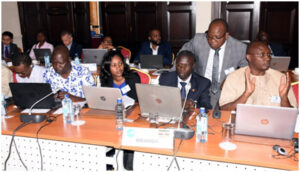The Institute of Policy Research and Analysis (IPRA) is an independent not-for-profit, nonpartisan research organization dedicated to the advancement of research-based knowledge and applied policy analysis, and capacity building to inform economic policies in Africa.
Our Mission
To inform and enhance policy debate for poverty alleviation in Africa by generating and sharing policy-relevant information and strengthening local capacity for evidence-based decision making
Our Vision
To become Africa’s centre of excellence in policy-oriented research
What We Do
The Institute’s work falls into three distinct fields: research; training and capacity building; and advisory services. The Institute’s research programme reflects institutional collaboration with industry and governments and is grouped into six broad themes: Trade and Economic Integration; Tax Policy and Domestic Revenue Mobilization;Fiscal Policy and Sovereign Debt; Productivity, Innovation, and Growth; Macroeconomic Policies, Shocks, and Poverty Reduction;Finance, SMEs & Gender. In all fields, the analytical approach is strongly rooted in applied quantitative methods.
Founded in 2001, and based in Kampala, the Institute provides objective advice and analysis, and maintains a rigorous, scientific approach to research, and a commitment to high quality. The Institute attempts to anticipate emerging issues and to be ready with a practical response to inform and shape public debate. Its audience includes government policymakers, the legislators, business and civic leaders, management and staff at international organisations, university-based scholars, policy analysts, researchers, and the media.

The Institute’s training programme targets professionals and high-level practitioners in industry, government, academia, and the media, who want to deepen their knowledge of topics in international trade and investment, and tax policy.
In addition to research and capacity building, the Institute is committed to promoting social and economic development through its extensive consulting and advisory services in the field of international trade and investment, and tax policy, offered to government institutions, international development agencies, and other public bodies.
INTELLECTUAL IMPACT
Our Board of Trustees
The Institute Board of Trustees is a governing body composed of distinguished individuals from a variety of backgrounds. The Board has fiduciary responsibility for the Institute’s leadership, integrity, financial health, and scholarly independence.The Board is made up of nine members, plus the Chairperson.
Our Experts & Staff
IPRA brings together more than 100 leading experts in government and academia from all over Africa and the diaspora who provide the highest quality research, policy recommendations, and analysis on a full range of public policy issues.
Financing
Largely, the Institute’s activities are funded from self-generated funds. As a non-recipient of government funding, the Institute is able to maintain a rigorous, scientific approach to research, while offering scope for timely, independent, well-informed contributions to public debate. The South Centre has been financed mainly by voluntary contributions from countries of the South. For more information, please e-mail admin(at)ipraa.org. Thank you.
Our History
The Institute of Policy Research and Analysis traces its beginnings to 1999, when a group of leading reformers (among them retired university professors working then for international organisations) founded the Development Policy Research Institute (DEPRI), the first private organization devoted to analysing public policy issues at the national level. Back then, Uganda was undergoing significant socioeconomic reforms, and the need for evidence-based knowledge and applied policy analysis was overwhelming. Charged with implementing the new Poverty Eradication Action Plan (PEAP), the Ministry of Finance, Planning and Economic Development (MFPED) sought to create a strategic alliance with non-state actors, including NGOs and experts who would conduct wide consultation with the communities across the country to provide a better understanding of the national priorities and generate evidence to inform the PEAP process. There was no true independent think-tank at the time, no single source of independent cutting-edge empirical analysis, insights and evidence that would allow informed public decision making. Decades of civil strife and systematic underinvestment in research eroded Uganda’s internal capacity to generate sound advice for public policy and the ability to use this knowledge for policymaking. That seemed like an obvious and important deficiency for what is after all a kin to The Economist’s description of being part of “the hopeless continent”.
On 1 May, 2000, the Institute opened up an office in Kampala.On 16 November, 2001 the Institute attained NGO status under the Non-Governmental Organisations Registration Statute, 1989, and was incorporated as a company limited by guarantee on 6 February 2002(Certificate No. 51946).With a humble beginning of one full-time staff who doubled as an administrative and research staff, and two volunteers, an old-school Pentium 3 computer, a keyboard, a monitor and a printer), the Institute made its earliest mark in Uganda, producing series of influential research and analysis on a range of policy issues from food security to poverty, trade, investment and tax policies.

A lot has changed since 2000. One thing has not changed at all. The Institute remains devoted to independent, in-depth research that leads to pragmatic and innovative solutions to problems facing African society. We enter our twenty first year with pride as Africa’s leading centre of research in the field of international trade and public finance and with enduring gratitude for our strong relationships with our partners and clients.




